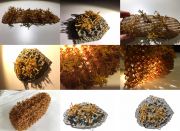Maria Paz Gutierrez
Artist Statement / Bio
Maria Paz Gutierrez, Associate Professor of Architecture at University of California, Berkeley, is an architect and researcher focused on nature and multifunctional material organizations and 21st century environmental and socioeconomic challenges. In 2008, she founded BIOMS, an interdisciplinary research initiative intersecting architecture and science to pioneer methods for integrating principles of design and biophysics from the nano to the building scale in contexts of risk. Her recent research focuses on exploring the biophysical and cultural implication of functional natural materials and agricultural waste (mainly gels and fibers) through multiscale digital fabrication and material computation. Gutierrez is the recipient of various prestigious research grants from leading scientific organizations, including the U.S. National Science Foundation, U.S. Department of Energy, and U.S. Environmental Protection Agency in the area of sustainable building systems innovation. Her research has been recognized as pioneering multiscale design through groundbreaking material innovations in building systems that self-regulate and optimize multiple objectives, opening new paths for architects in the engineering and scientific communities, including at the National Academy of Engineering (U.S.). Her work has been published in leading scientific journals, including Science and Scientific Reports (Nature); exhibited in leading venues, including the Field Museum, Chicago; and widely covered in the press, including in Science Nation. Gutierrez's prestigious accolades include being named a semifinalist for the 2014 Buckminster Fuller Award and receiving the 2010 Emerging Frontiers of Research Innovation Award from the U.S. National Science Foundation. She is a Fulbright NEXUS Scholar and served as an appointed Senior Fellow of the Energy Climate Partnership of the Americas by the U.S. Department of State from 2011-2016. Gutierrez has two provisional patents and a forthcoming book, Regeneration Wall (Routledge Press).



